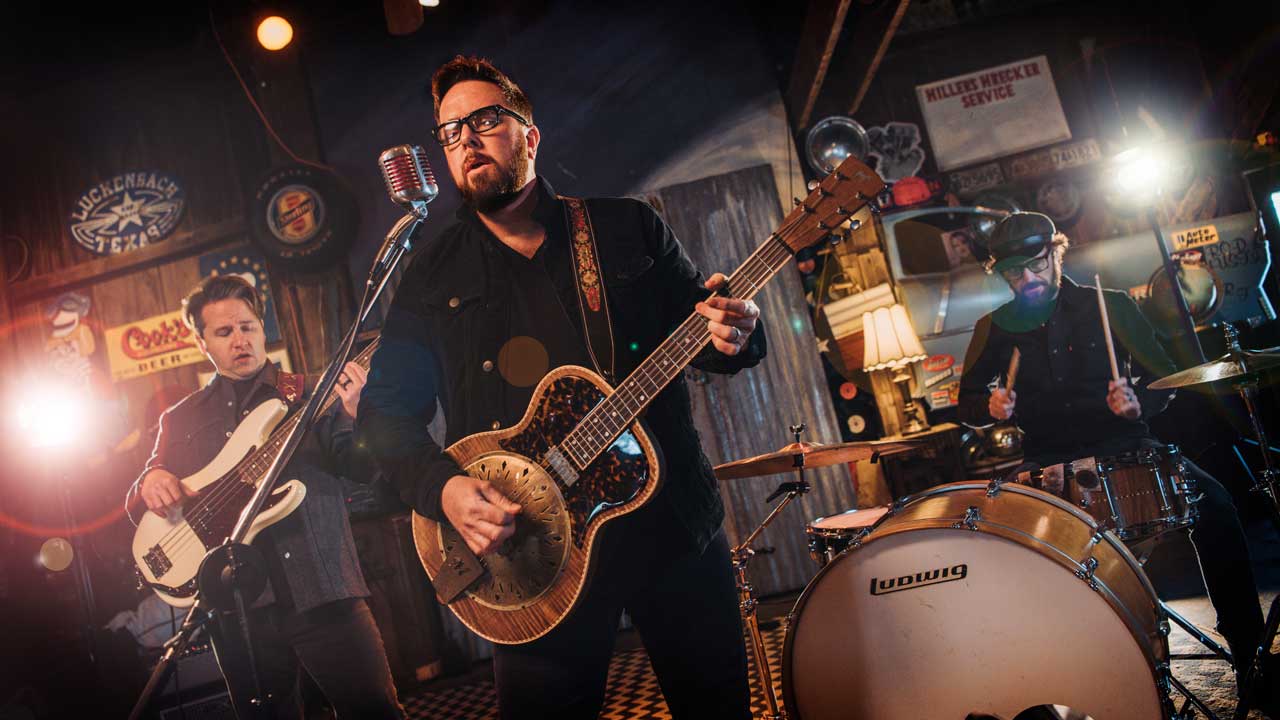
As far back as he can remember, whenever Chris Tapp opened a music magazine or was introduced by a DJ, the ‘S’ word preceded him.
“We were always getting tagged as ‘southern’ something,” The Cold Stares frontman says, smiling. “Y’know, ‘southern rock’, ‘southern gothic’… We just thought of ourselves as a blues-rock band.”
Talking to Kentucky-born Tapp today, the Bluegrass State is present in the singer’s twang. Musically, though, things are a little muddier. The Cold Stares formed in 2012, and the trio’s six albums to date are as much in thrall to the British Invasion as to the Allmans/Skynyrd set texts.
That figures, Tapp shrugs: “When I was thirteen and they needed a guitar player at the Moose Lodge, they’d bring me in the side door. I’d sit in with the old guys. And Skynyrd was part of that – I loved their early stuff, and was always sad they got tied into that rebel-flag garbage. But we also played Zeppelin, Bad Company, Robin Trower. I thought Free were from Alabama, because it sounded southern to me. I was never a bluegrass guy. I always had a rock’n’roll bone in me.”
It was around the time that last year’s acclaimed Voices was attracting the usual descriptors that Tapp wondered what might happen if he, drummer Brian Mullins and bassist Bryce Klueh embraced their own version of the South, rather than the media’s glib definition.
“I just started thinking about what ‘southern’ meant to me, and what it was really like growing up in these small towns.”
But the real kick-starter for the band’s seventh album – emphatically titled The Southern, and driven by resonator guitars and tales of local hoodoo – was Tapp’s visit last November to the town of Dixon (population 900), where he lived after high school in the late 90s. The trip birthed the album’s bone-rattling key track Coming Home, which feels like a love letter to this unremarkable small town as he saw it, now and then.
“I was thinking about the local characters while writing Coming Home,” he says. “My granddad used to take me to the barber shop, and there was a black guy called Hoppy who’d sing an old gospel song and tap out a rhythm as he shined shoes with a rag. You don’t think of small towns in the South as diverse, but it really was.”
While writing Coming Home, Tapp’s thoughts also turned to an adolescence spent defying the South’s enduring pockets of prohibition. “We were blowing things up with fireworks, driving cars at twelve years old when our parents were outta town. I grew up in a dry county, but my great-grandfather ran moonshine to Tennessee. I tried it, of course. It was like drinking fire. A teaspoon would put you in la-la land.”
When he remembers his South, adds Tapp, he thinks about the central role of family, and the disconnect between the suited relatives who filled the pews on Sundays and their often-outrageous private antics.
“It didn’t matter if I got home at four a.m. on Saturday night, I was expected in church next morning,” he reflects. “One of my granddads was a very Southern guy: if I didn’t open the door for a lady, I got popped in the back of the head.”
For other songs, Tapp extrapolates from his own Southern experience to regional mythology. Take Mortality Blues, the brittle finale, with lyrics that sit somewhere between gospel and hoodoo. “When I was seventeen, my dad let me drive his tyre company’s delivery truck down through Tennessee. I’d see the cotton fields, think about the folklore. That’s the top of the Delta, and I fell in love with the idea of Robert Johnson. He was just trying to stay alive, which felt like home to me, because I had to get through cancer to stay in this world.”
Elsewhere on The Southern, Tapp claps back at the portrayal of his home turf. “Part of the mind-set behind this record was because I was hearing a lot of guys talk about poverty and racial things that we didn’t experience. You had Jason Isbell and Tyler Childers saying what ‘Southern’ was. But my experience was much different. We didn’t see a lot of the things we get stabbed with.”
No Love In The City Anymore paints grim pictures of vagrancy, but the singer says it was the supposedly civilised North that inspired it. “I wrote that in New York – we saw guys drugged out, people just stepping over them. In Southern rural areas with a lot of poverty, I feel like those people cling together. If somebody’s down on the sidewalk, people say: ‘Hey, you okay?’”
Likewise, as our conversation segues into Looking For A Fight – a galloping rocker about America’s bitter culture wars – Tapp won’t have the South painted as a Trump stronghold (or a Democrat one, for that matter). “The country is split in half, but it’s not based on North or South. I’ve neighbours on both sides. The media has stoked fires by saying: ‘Your candidate is going to destroy the country, they’re Hitler.’ Then they turn around and say: ‘Well, your candidate is going to end democracy.’ You’ve still got all the people at the top with all the money, controlling us all, and they love to see us fight. I’m sick of it.”
Proud Southerners they might now be, but the impression after hearing The Cold Stares’ new album is of a band putting their hands across the divide.
“We need to let people finish their sentences and see where they’re coming from,” concludes Tapp. “Where I grew up, you’d get in a fight but then you’d shake hands. After all, you knew you had to see their parents in church.”
The Southern is out now via Mascot Records.







